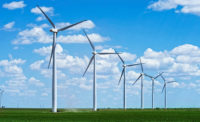U.S. wind energy continued to rebound in the second quarter, with 2,151 megawatts (MW) of electrical generating capacity installed in the first half of 2011 vs. 1,250 MW during the same time in 2010 (up 72%). However, analysts at the American Wind Energy Association (AWEA) have cautioned that without stable policy such as an extension of the Production Tax Credit, which is set to expire in 2012, the industry’s recovery will stall.
Project activity and orders for 2013 and beyond are scant because of the lack of a predictable business environment, causing layoffs and even bankruptcies in American manufacturing plants and the supply chain, said AWEA. These struggles for U.S. wind manufacturers will only worsen if Congress allows the tax credit to expire. Ironically, due to the Production Tax Credit and market stability over the past five years, domestic content in the U.S. industry reached a record high of 60% through 2010, according to a recent U.S. Department of Energy (DOE) report.
“Clearly Congress cannot take for granted all the wind energy manufacturing and construction jobs that have been a bright spot through the recession,” said Denise Bode, CEO of the AWEA. “Wind tax credits enjoy broad bipartisan support, and since they’re not spending programs, current projects are safe and prospects for extension of the Production Tax Credit beyond 2012 are good.”
The fast-growing wind sector averaged 3.2% of the nation’s electricity over the strong wind months between January and April 2011, according to the Energy Information Administration’s Electric Power Monthly report. For now, wind energy remains ahead of schedule to generate 20% of America’s electricity by 2030, the goal identified by the DOE under the George W. Bush Administration.
“We’re making more clean, homegrown energy, and prices are more affordable than ever,” Bode said. A report by nationally known energy consumer advocate Mark Cooper, released in May by the Vermont Law School, found that wind energy today is such a good deal that it helps hold down overall prices for electricity in the long term. Cooper asserted that an American utility would be irresponsible not to invest in such a fixed-price source of power.
For more information, visitwww.awea.org.
The latest news and information
Content focused on adhesive & sealant manufacturing, formulations and finished products
SUBSCRIBE TODAYCopyright ©2024. All Rights Reserved BNP Media.
Design, CMS, Hosting & Web Development :: ePublishing
